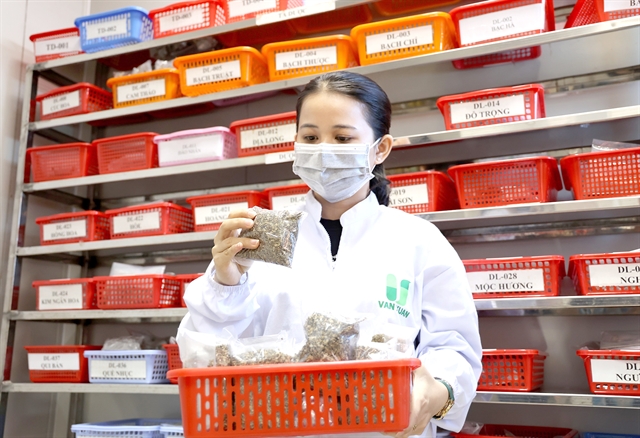 |
| A pharmacist checks medicinal herb samples in a company in Đức Hòa Commune, the Mekong Delta province of Long An.—VNA/VNS Photo Hồng Đạt |
HÀ NỘI — Specific policies in the development of medicinal herbs, particularly valuable and economically beneficial medicinal herbs need to be issued, as a matter of some urgency.
That was the directive came under the 86th conclusion of the Secretariat on developing Việt Nam’s traditional medicine and the Việt Nam Orientally Traditional Oriental Medicine Association in the new period, recently signed by the permanent member of the Party Central Committee’s Secretariat Lương Cường.
The Secretariat ordered that all levels of Party committees, authorities, the Việt Nam Fatherland Front and socio-political organisations must plan and develop areas for cultivating medicinal herbs on an industrial scale, establish a traceability system and ensure the safety of medicinal herbs.
The development of the medicinal herb industry should be linked with scientific research, production and preservation and processing chains.
Efforts should be intensified to coordinate between ministries, sectors and localities in managing medicinal herbs, enhancing quality control and resolutely fighting against counterfeit, substandard and untraceable traditional medicine products.
Furthermore, the Secretariat called for the effective implementation of Directive 24, the resolutions of the 13th National Party Congress and the Party’s policies on protecting, caring for and improving the health of the people.
It should renew and enhance dissemination, education and determine the responsibility and actions of all levels of Party committees, authorities, officials, Party members and the public in developing Việt Nam’s traditional medicine, contributing to preserving and promoting the national cultural heritage, the conclusion says.
The Secretariat demanded a review and completion of relevant policies and laws, continuing to concretise policies on traditional medicine, renewing the management system, diversifying and improving the quality of traditional medicine services in conjunction with health tourism.
Investment must be increased, focusing on training and developing herbalists and traditional medicine practitioners, ensuring sufficient human resources from central to local levels.
Mobilisation of social resources for the development of Việt Nam’s traditional medicine needs to be strengthened, the conclusion adds.
Developing the traditional medicine healthcare system, especially at grassroots health levels, integrating traditional medicine with modern medicine, research and testing and proving the efficacy of non-drug treatment methods should be prioritised.
A comprehensive database of medicinal herbs and traditional medicines must be developed, connected with national and specialised databases, promoting the application of science, technology and digital transformation in traditional medicine.
Proactive international integration and effective international cooperation should be pursued, promoting the image and brand of Vietnamese traditional medicine and creating policies to export traditional medicine products, including high-quality human resources and non-drug treatment methods.
Participation in professional and educational associations on traditional medicine regionally and globally; support for discovering, registering and protecting intellectual property rights in traditional medicine; honouring and ensuring the rights of renowned physicians, implementing specific policies for registering and protecting intellectual property rights; and safeguarding the secrets of traditional medicine formulation are among the requirements from the Secretariat.
The Secretariat also told the Việt Nam Traditional Oriental Medicine Association and socio-political organisations to actively disseminate and provide information on Vietnamese traditional medicine, effective remedies, and treatment methods to both domestic and international populations.
Coordination with media agencies to introduce and replicate effective models and exemplary practices in traditional medicine development is necessary.
Relevant agencies have to boost the campaigns ‘Vietnamese people prioritise using Vietnamese goods’ and ‘Vietnamese people prioritise using Vietnamese medicine’.
The Government has been asked to direct the issuance of documents to develop Vietnamese traditional medicine and the Việt Nam Traditional Oriental Medicine Association for the period 2025-30, with vision towards 2045.
The Ministry of Health and Việt Nam Oriental Traditional Oriental Medicine Association are tasked to closely coordinate with relevant agencies and localities to effectively implement the conclusions.
The Party Central Committee’s Commission for Publicity and Education, in collaboration with the health ministry and relevant agencies are assigned to guide, supervise and periodically report to the Secretariat on the implementation of the conclusions.— VNS
- Reduce Hair Loss with PURA D’OR Gold Label Shampoo
- Castor Oil Has Made a “Huge” Difference With Hair and Brow Growth
- Excessive hair loss in men: Signs of illness that cannot be subjective
- Dịch Vụ SEO Website ở Los Angeles, CA: đưa trang web doanh nghiệp bạn lên top Google
- Nails Salon Sierra Madre
 VnExpress News The News Gateway of Vietnam
VnExpress News The News Gateway of Vietnam





